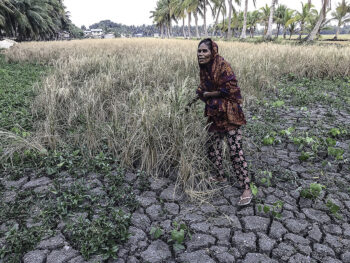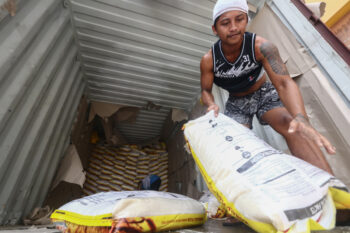(Speech delivered by Guiamel Alim at the Global Autonomy, Governance, Federalism forum on Day 2, 20 October 2016 at Dusit Thani hotel in Makati City. Mr. Alim is a member of the Council of Elders of the Consortium of Bangsamoro Civil Society and is executive director of Kadtuntaya Foundation)
Good afternoon. ”Assalamu alaykum warahmatullahi wabarakatuhu!”
Speaking of CSOs, I think most of us know that one of the more vibrant civil societies in Asia, and maybe elsewhere, is that found in the Philippines. In the issue of peace in Mindanao, civil society organizations (or CSOs) have shown dynamism and active participation over the years. Indeed, CSOs have taken on different roles that range from civilian protection, to ceasefire monitoring, to peace education, to service delivery and rehabilitation of conflict-affected and displaced communities, and even shuttle diplomacy between the negotiating parties, among others.
Aside from these, they also play important roles in areas that indirectly support the peace process— by doing advocacy and capacity building for good governance, support for policy-making, development, and democracy-building.
All these efforts are geared towards helping create an environment conducive to the peace talks, providing public support and political sustainability for the negotiations and the agreements. These self-assigned tasks within the realm of what is known as “Track II Diplomacy” have been executed in various and creative ways. In some occasions in the past, CSOs have even tried to enter Track I Diplomacy, seeking a seat in the peace table, even if only as observers.
In 2008, after the botched signing of an important agreement on ancestral domain in the peace process between the Government of the Philippines and the Moro Islamic Liberation Front (MILF), CSOs were actually included in the mechanisms of the evolving peace infrastructure in that peace process—as part of the Civilian Protection Component and the International Contact Group, which is a “hybrid” structure that includes both States and International NGOs.
For local CSOs, however, the burden was really to rally support for the peace process. And this is where the CSOs got creative— doing grassroots advocacy and education work, explaining the need for peace, presenting the negative effects of the conflict, and the ways forward. In several instances, CSOs have shown strong unity and partnerships with each other and with the protagonists in the peace process, in the direst of times, when hope was fading and spoilers abound.
Outside of the peace process, CSOs also take on the challenge of bringing different groups together in a horizontal peace process, as other kinds of violent conflicts abound in the communities.
On hindsight, I could see the glorious days of CSOs working hand in hand in rallying around the peace process. But since a peace agreement had been signed, and the peace process moved towards the implementation phase, the peace work of CSOs have been threatened by disunity among its ranks. While everyone was united on the idea of peace and the process by which it was to be achieved—i.e., through a negotiated political settlement– there was no clear bases of unity in the substantive agenda for sustainable peace.
Different groups had different pet advocacies, and saw the peace agreement in different lenses. Hence, while majority of the CSOs were supportive of the peace agreement and the idea of giving an asymmetrical autonomy for the Bangsamoro, different groups saw the Bangsamoro Basic Law (BBL) differently.
After all, it is in the BBL where details of the powers to be given to the Bangsamoro are supposed to be articulated. In short, while everyone agreed on motherhood statements for peace, it is in the details where there was division, and even competition, as sectoral interests got in the way.
Sadly, underlying some of these differences were the varied understanding of the root causes of the conflict, and even latent prejudices and stereotypes about what the Bangsamoro is and is not capable of doing. Some advocacies were project-driven, and just anchored on single issues, forgetting the larger picture of this second chance at peace-making.
Other groups, on the other hand, have turned apolitical, lured by the “safer” task of delivering services and being turned into virtual “appendices” of national or international organizations in implementing social service delivery projects.
Challenges and opportunities
Now, as we face the same task of lobbying for the BBL in the 17th Congress, we are faced with the challenge of doing things better and, being more coordinated and united. We have to be able to learn from our mistakes and work on our differences, in the same way that the peace panels from Government and the MILF and the MNLF have overcome seemingly insurmountable difficulties during their respective negotiations.
Dialogues between and among CSOs should be enhanced, as we move forward to additional challenges that are before us. With peace within our reach, we should strive even harder to reap those promised dividends for our people.
Some thoughts on how to move forward
As a (former) community organizer, I know just how important and potent the work of CSOs are in building peace and potentially, even in the political transition that we are looking forward to.
Hence, I think it is imperative for like-minded CSOs to continuously find that common agenda that bind them together. For Bangsamoro CSOs, intra-Moro dialogue towards unity should be a first objective in reaching the goal of sustainable peace.
But we do not stop there, as we should be able to bring together the greatest consensus beyond the Bangsamoro, and among Mindanaowons. Thus, building inter-group relations for solidarity-building is likewise an important objective. Bridging ties among different organizations with varied sectoral and other agenda is a necessary step towards that greater consensus.
As we do this, and as we move towards political transition, we face additional challenges. As we move towards a desired state of affairs in the Bangsamoro, we have to deal with the culture of impunity that for decades have been ingrained in our structures and way of life. We have to contend with the many ways of promoting transitional justice, as we desire to address historical injustice, legitimate grievances, human rights violations, and marginalization through land dispossession.
Surely, these are challenging times as the new administration has raised the ante— from an asymmetrical autonomy, we are even asked to ponder upon the question of a nationwide arrangement for federalization. If the details of the Bangsamoro autonomy had divided the CSOs in Mindanao, federalism and its different models and formulations, can very well do the same, if we are not sensitive to the many latent and manifest divides that are there
Conclusion
In conclusion, I would say that CSOs, as the organized groups that connect the communities to the decision-makers, are a very powerful stakeholder in the issue of Mindanao peace. They have played and are still playing important roles in the peace-building, peace-making, and potentially, in the expected political transition. There is a need among CSOs for continuous dialogues and conversations to define common and larger interests that will maintain their cohesion, potency and relevance in the lives of the people for whose benefit, peace eventually lies.
It is my fervent hope that we can cross the divides and work for a cause greater than ourselves.
Thank you.







